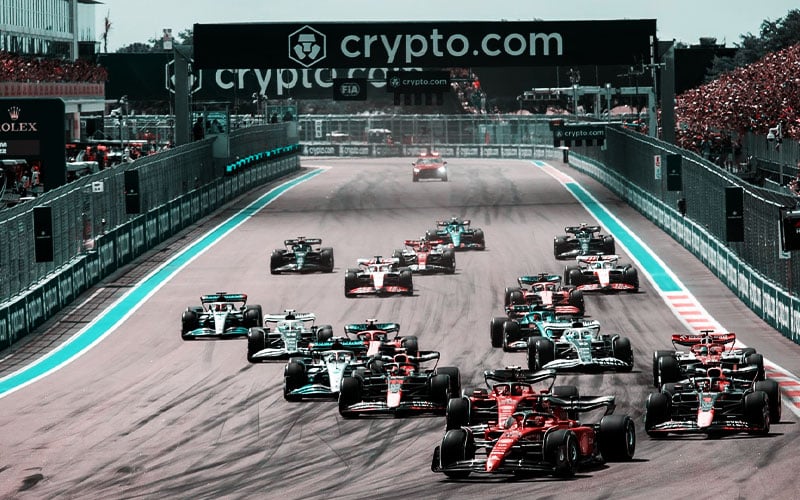The Formula 1 Championship is witnessing the race of crypto companies’ sponsorship along with the race cars and their credibility is put to the test in the current bear market.
According to a Bloomberg report, at the Singapore Grand Prix to be held this weekend, the Monetary Authority of Singapore will only let teams display the logos of their cryptocurrency sponsors on their cars and uniforms; no outside advertising will be allowed on the track or in the local area.
The present market conditions may prompt cryptocurrency companies to be a little more cautious and thoughtful about the agreements they sign moving forward, said Jeremy Walls, a senior executive with the Miami venue who assisted in the partnership deal closing with Crypto.com.
For cryptocurrency firms, partnering with an F1 team has become a status symbol. In addition to Formula One Group, which has a $100 million partnership with Crypto.com, 80% of F1 teams also have at least one cryptocurrency partner.
Authorities in Singapore, the UK, and France have increased their regulation this year due to falling digital asset values, the failure of multibillion-dollar projects, and the bankruptcies of significant market participants. As a result, the newest wave of F1 advertisers is figuring out more subtle methods to leave their mark.
Also Read: France’s Advertising Laws Affect F1 Teams Crypto Branding
The worldwide and devoted fan base of F1 is what makes the sport an attractive offer for sponsors. The competition is anticipated to set a record in 2019 with 24 races spread over 21 nations and nine months.
Due to the sport’s high fee barrier to entry, where tickets start at hundreds of dollars and TV companies must pay significant fees for exclusive broadcasting rights, fans are also frequently richer, the perfect target for crypto companies.
With the market for digital assets already declining, it is questionable whether crypto businesses will be able to maintain the pace of dealmaking in sports. According to Avi Dabir, several firms, including Crypto.com and Bybit, slashed their workforce earlier this year, while others, like FTX, choose to value their F1 agreements annually.
Daniel Ricciardo, a McLaren racer, is currently contracted as a brand ambassador for OKX, although he is anticipated to switch teams at the end of this season, marking his third move in five years.
The Turkish exchange Bitci.com, which at the time was the first to operate a fan token for an F1 team, was another prior cryptocurrency partner of McLaren.
The agreement was quietly terminated along with two other Bitci.com agreements with European football clubs after the company failed to make payments to some of its partners.
Due diligence has become even more crucial this year as a result of a slew of significant cryptocurrency crashes and increased regulation.
According to Lindsey Eckhouse, the team’s director of licensing, e-commerce, e-sports, and gaming, McLaren is currently investigating a new fan token with OKX, which it intends to deploy in 2023 after taking its time to assure very strong development.
Racing team sponsorships are normally more expensive than those for other sports, but Crypto.com Chief Marketing Officer Steven Kalifowitz claimed that the exchange’s F1 deals were some of its first.
The future of F1’s multi-year partnerships, though, is uncertain because cryptocurrency is locked near its yearly lows and because the overall economic environment may be about to deteriorate.
Kalifowitz noted “I was looking for ways to meet a global audience and meet them quickly. F1 delivers on that in a way I don’t think any other sport does.”
According to Ted Dobrzynski, president of F1 sponsorship agency VIAGP, it is common in the sport for partners to come and go if a sponsor suddenly cannot reach the millions of dollars required to stay in the race.
Let’s wait and see how many of these crypto firms will be visible in the game next year!!






